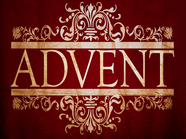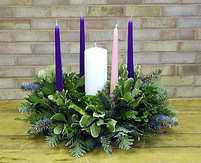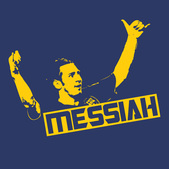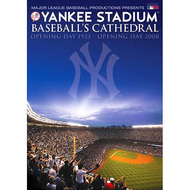

So, when people wish me “Merry Christmas” this year before Christmas Eve, I am going to make a concerted effort to reply “Thoughtful Advent” – they’ll probably think me a pretentious idiot but hey ho…
 Sunday marked the start of Advent and the beginning of a new year in the Church. The Season of Advent is a penitential season, a time for introspection and preparation for the coming of Jesus at Christmas. The word comes from the Latin term Adventus – which means “coming”. This is a translation of the Greek word Parousia – commonly referred to as the second coming of Christ. So it is that Advent is looking forward to celebrating Christ’s first coming, but also anticipates the second coming of Jesus and the subsequent judgement that will follow.  This focus on the Eschaton (see the previous WotW) means that Advent is a time of the year when Christians focus on reforming themselves. Even the colours used in Church reflect this attitude as the vestments and altar cloths turn to purple and blue which are traditionally penitential and hopeful colours. Traditions that Christians in the West have tended to follow at this time of the year include lighting a candle on an Advent wreath each successive Sunday to represent a different aspect of Christian history that preceded Jesus: The Patriarchs, Prophets, St John the Baptist and The Angel Gabriel’s annunciation are remembered on successive Sundays. If the wreath, as in the image here, features a fifth candle this is known as the Christ Candle and is lit on Christmas Eve. I don’t want to get on a soap-box about this (but I'm going to!), but I think it is quite clear that in modern society we have lost sight of this season and have certainly lost the value of it. So many people say that by the time Boxing Day arrives they are fed up with Christmas, having had it rammed down their throat for the past month or probably more. This should not be the case and was not the case in the past; Christmas really begins on the 24th December and then lasts 40 days – how many of us in early February are still thinking about the Christmas message? Not many. We have, probably due to the commercialisation of Christmas and our instant gratification society, got it all the wrong way round (you only have to think about the scenes on Black Friday). We don't want to wait for it and we are too focused on the material side of Christmas. What's wrong with a bit of anticipation and delayed gratification?
So, when people wish me “Merry Christmas” this year before Christmas Eve, I am going to make a concerted effort to reply “Thoughtful Advent” – they’ll probably think me a pretentious idiot but hey ho…  The Commonwealth Games started today and this has already been a summer that seems to have been packed with sporting events; The Football World Cup, Wimbledon, The Open Golf and Test Matches to name but a few. When you see the fanaticism of fans, the dedication of supporters and the god-like status of the sport-stars it is easy to see why people sometimes equate sport with religion - indeed some argue that for many it has replaced religion altogether In this post I want to examine what the similarities are, but also suggest that it is a false dichotomy to suggest you must have one or the other.  Messi the Messiah? Arguably the most obvious way that sport seems to be like religion is in the way that sport-stars like Messi, Bolt and McCaw are worshipped and adored by their fans. Having their names screamed by thousands, their names on the back of replica shirts and their images all over the media. They surely are as close to super-human as we can get! Some scholars believe that fans are highly committed to their favoured stars and teams in a way that gives focus and meaning to their daily lives (Barber).  Stadia - Modern Cathedrals Just as the Cathedrals and Abbeys were built in the Medieval era to demonstrate the prowess of a nation or ruler, the same could be said of modern stadia - "cathedrals [are] where followers gather to worship their heroes and pray for their successes."(Wann, et al., 2001, p. 200). You only need to think about the massive building projects that accompany modern Olympics or World Cups - Beijing 2008, London 2012 and Brazil 2014 have all seemingly tried to outdo each other. These building inspire awe and wonder in the modern era just as Cathedrals still have the power to do. Rituals of Sport Just as religious devotees do, so sport fans also wear ritualistic clothing, have special colours, wave flags, and sing anthems together. Individual sportsmen have odd customs too such as lucky socks, putting on their kit in a certain order and offering prayers before taking to the pitch.  The Experience of Sport Another obvious comparison with religion and what modern sport offers people today is a wonderful experience - Rudolf Otto defined the term ”Numinous” - the realisation of the divine and the wholly other. Many would argue that participation in sport or watching sport is the closest thing to this that many experience. Being a spectator can provide moments of elation and transcend ones everyday existence. This can be seen in negative terms - Sam Harris has suggested that sport is the new “opiate of the people” after Karl Marx’s critique of organised religion. But is it fair to suggest that sport is just escapism for the humdrum of everyday life? Sense of Community and shared values Sport also provides people with an instant community - people who love the same thing as each other and buy into the same values. The Rugby Football Union calls itself "the community game" and emphasises the shared values of Rugby which include fair-play, discipline and tolerance. In modern Britain it could be argued that the church used to provide these values but for many sport now fulfils this role.  A False Dichotomy? Having discussed how sport might be seen as the new religion - I still personally have my doubts. Whilst sport has many of the features of religious practice this does not mean that it has replaced faith. In Britain and Western Europe it is true that religion has declined massively in recent decades and at the same time the interest in sport has hugely increased. This is however a western phenomenon and in many other parts of the world such as Eastern Europe, Russia and the Americas participation in religion has been massively increasing (Davie). It is therefore not surprising that many sportsmen credit their successes to the divine and see their faith as integral to their sport - the Brazil football team prayed together throughout the World Cup (although it did not seem to help them against Germany! http://www.bbc.co.uk/sport/0/football/28202816). Some psychologists even argue that it could be advantageous to be religious and help improve the performance of athletes (http://www.bbc.co.uk/sport/0/olympics/18893284). It is not only the competitors who are religious; “Sports fans are fairly religious” (Barber) and in research before the last Super-Bowl half of the fans believed that the supernatural has a role to play in the success of their team (http://publicreligion.org/research/2014/01/jan-2014-sports-poll/) I am sure that over the next weeks as the Commonwealth games plays out you will see a number of religious acts; Athletes crossing themselves, offering a quiet prayer after success (e.g. Mo Farah) or thanking God publicly for their achievements. In my mind it does not need to be one or the other, this is a false dichotomy. References Is Sport a Religion? | Psychology Today, Nigel Barber, 2009 http://www.psychologytoday.com/blog/the-human-beast/200911/is-sport-religion Sport fans: The psychology and social impact of spectators, Wann, D. L., Melznick, M. J., Russell, G. W., & Pease, D. G. New York: Routledge. 2001. Sport is new opium of the people, Harris, S. J. (1981, November 3). Democrat and Chronicle, p. 3B. Religion in Modern Europe, Grace Davie, OUP, 2000 |
Archives
June 2016
Categories
All
|
